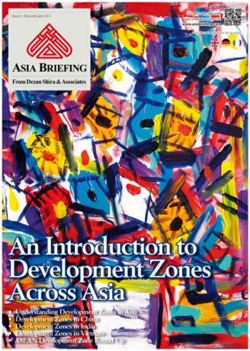 May 7 – The new issue of Asia Briefing Magazine, titled An Introduction to Development Zones Across Asia, is out now and will be temporarily available as a complimentary PDF download on the Asia Briefing Bookstore throughout the months of May and June.
May 7 – The new issue of Asia Briefing Magazine, titled An Introduction to Development Zones Across Asia, is out now and will be temporarily available as a complimentary PDF download on the Asia Briefing Bookstore throughout the months of May and June.
The use of development zones in their different guises has been an effective model essentially brought to prominence by China over the past 25 years to help both foreign investors and domestic companies meet in a relationship that provides tax advantages to both. Development zones typically permit the foreign investor to bring component parts into a country for assembly without having to pay import duties. Investors may then add in locally-sourced components, assemble the final product, and warehouse it all duty free before then having the option of exporting the finished product (collecting some VAT rebates on the locally sourced portion) or entering the domestic market with a product assembled at local labor costs.
While China has shown spectacular use of development zones, and now has multiple types of them to fulfill slightly different functions, the basic premise remains the same – avoiding duties on unfinished products to permit local labor to add value. That concept has now become commonplace around Asia and internationally. However, the forms of these zones, and even their terminology, differ from country to country, as do the standards of zones available. While Shenzhen in China may be in its entirety a special economic zone, the same terminology in India is not so expansive. There are also differences in operational quality between government-run zones with available and well-educated customs and inspection officials, and those run privately, which can be more haphazard.
In this issue of Asia Briefing Magazine, we break down the various types of development zones available in China, India and Vietnam specifically, as well as their key characteristics and leading advantages. We then go on to provide a snapshot of the latest development zones across the rest of Asia. With several hundred development zones operating in the region, it is impossible to cover them all in the pages of just one publication. However, we hope that this issue will provide the basic fundamentals to understanding one of the most important business tools available to international businesses operating in Asia.
In this issue:
- Understanding Development Zones in Asia
- Development Zones in China
- Development Zones in India
- Development Zones in Vietnam
- ASEAN Development Zone Round Up
An Introduction to Development Zones Across Asia is out now and immediately available as a complimentary PDF download on the Asia Briefing Bookstore.
Dezan Shira & Associates is a specialist foreign direct investment practice, providing corporate establishment, business advisory, tax advisory and compliance, accounting, payroll, due diligence and financial review services to multinationals investing in emerging Asia. Since its establishment in 1992, the firm has grown into one of Asia’s most versatile full-service consultancies with operational offices across China, Hong Kong, India, Singapore and Vietnam as well as liaison offices in Italy and the United States.
For further details or to contact the firm, please email asia@dezshira.com, visit www.dezshira.com, or download the company brochure.
You can stay up to date with the latest business and investment trends across Asia by subscribing to Asia Briefing’s complimentary update service featuring news, commentary, guides, and multimedia resources.


